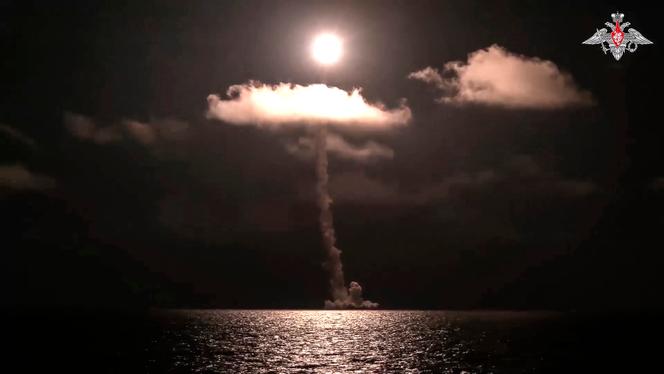


Following the huge 2022 success of his song "I am Russian," the ultranationalist pop singer Shaman has become the favorite artist of the Russian regime, which subsidizes his shows to the tune of millions of rubles. On November 4, on the occasion of "Unity Day," no less than three TV channels broadcast the concert in which he took part.
The singer had rightly saved his hit song for the finale, but viewers were eventually treated to a surprise: just as Shaman screamed out, while lipsyncing, his chorus ("I'm Russian, I'm going all the way..."), an extra in a suit and sunglasses came on stage to present him with an open briefcase. In the middle was a big red button, which the singer enthusiastically pressed, to set off ... nothing but fireworks.
The episode is not only indicative of a climate that trivializes the use of atomic weapons and fosters mortifying ultranationalist one-upmanship, which is in line with Vladimir Putin's 2018 declaration on the subject of a possible nuclear confrontation: "As martyrs, we'll go to heaven, and they [the West] will simply croak." It comes precisely at a time when Moscow is striving to give substance to its nuclear threats.
The most significant gesture was the termination of the Comprehensive Nuclear Test Ban Treaty (CTBT) on November 2. On that day, Putin announced a law revoking Russia's 2000 ratification of the treaty. Although it has been available for signature since 1996, it was never enacted since it has not been ratified by enough countries, including the United States.
This decision also coincides with another Russian withdrawal from the Treaty on Conventional Armed Forces in Europe (CFE), which was announced in May and came into effect on Tuesday, November 7. In response, North Atlantic Treaty Organization (NATO) countries announced on the same day that they were suspending their participation in this agreement limiting conventional arsenals on the continent. Russia formally withdrew from this treaty, which was signed in 1990 and intended to turn the page on the Cold War, blaming the United States for this decision. Moscow accused Washington of undermining the security architecture put in place in Europe by promoting the expansion of the Atlantic Alliance.
One after another, the regulatory instruments of the 1990s are being renounced. In the wake of the CTBT withdrawal, the Russian Foreign Ministry maintained that Moscow would "continue to respect the moratorium on nuclear testing," but stressed that potential "large-scale testing" by the USA would "oblige" Russia to "do the same." In announcing his intention to leave the treaty at the beginning of October, Putin was initially less formal, saying only, "I'm not ready to say whether or not we should resume testing." At the same time, the American television channel CNN reported that Russia, China and the USA were carrying out construction work, sometimes underground, on known nuclear test sites – in the Arctic archipelago of Novaya Zemlya, in Russia's case.
You have 45% of this article left to read. The rest is for subscribers only.
